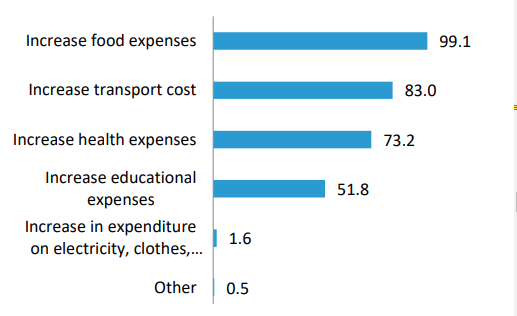ECONOMYNEXT – According to the latest released survey by the Department of Census and Statistics, the most commonly reported reason for increases in average monthly expenditure in households, accounting for 99.1 percent of replies, was an increase in food expenses.
“Among households that reported an increase in their average monthly expenditure, the most commonly reported reason, accounting for 99.1% of responses, was the increase in food expenses. This indicates that the majority of these households experienced a rise in their spending specifically on food items,” the report found.
Around 75 percent of households in the past year have limited spending or controlled expenses, as a means to cope with the economic crisis’ effects on household expenditure, according to the report.
Sri Lanka faced its worst economic crisis since independence last year. Beside limiting expenses, Sri Lankan households have also resorted to dietary changes, with another 75 percent reporting to have undergone changes in diets.
The report finds that approximately 97.2 percent of households used at least one coping mechanism to control their household expenses.

The data also shows that 60 percent of income earners reported a decrease in at least one income source, while a minute 3.4 percent of income earners reported increases of at least one of their incomes since March 2022.
Aligning spending with the decline in income was the main reason given by 77 percent of households for cutting their average monthly expenditure.
This indicates that households changed the way they spent money to reflect the decline in their income.

“The economic crisis has significantly impacted household income and expenditure patterns, compelling households to make strategic adjustments and implement coping mechanisms to manage their financial stability in these challenging times.”
Many households also reported that their average monthly income decreased during the economic crisis for a variety of reasons. “Less working hours,” which accounted for 48.7 percent of respondents, was the most often mentioned factor.
The most commonly reported coping strategy from homes that had utilised a means to cope with the crisis relating to reduced household income was to do nothing, reported by 73 percent, or turn to a secondary job or an additional source of income, reported only by 6.6 percent of households.
On the other hand, “Loans, mortgages, or seeking food/money from others” was the least common coping method mentioned by these households. (Colombo/Jan5/2024)

